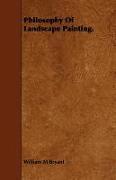- Start
- Philosophy of Landscape Painting
Philosophy of Landscape Painting
Angebote / Angebote:
PHILOSOPHY LANDSCAPE PAINTINGS. WILLIAM M. BRYANT. Art viewed as a whole is but the splendid spectrum of the white light of Truth shining through the prism of human sensibility. THE ST. LOUIS NEWS COMPANY. ST. LOUIS, MO. PREFACE. In extant works on the philosophy of art landscape painting is passed over with very brief mention. It is the purpose of the followiig pages to supply what is lacking in this respect. In working out this purpose it has assuned three principal phases. The first phase is unfolded in the proof that the modern scientific view of nature, together with its necessary complement the scientific view of man, lnust first have been developed before true la, ndscape a, rt could exist. The second phase takes shape a in the tracing out of the elements, external and internal, which enter int, o works of art of this class b in indicating the relation of lailtlsenpe painting to the other forms of art, and c ill defining and accounting for the types into which the products of this form of art iaturally fall. Finally the tili, d phase presents the realized uuit1x of the first 2nd second phalses in a brief eketch of the actual historical development of landscape painting. And here the primary airn has been to show the centrel significance of the successive phases in the developlllen t of landscale painting through an interpretation of works of leading artists in the several schools. If this purpose has been successfully wrought out the rolume now presented to the reader can hardly fail to prove serviceable as an introduction to the stltly of the philosophy of art in general. As to form that has been made as little techni- cal as possible. While in the first place the theme is philosophy, it is also in the second place philo- sophy as applied to, or rather as inrolred in the prodncts of one species of art. There is, there- fore, greater range here for the use of imagery than is the case i11 the treatment of the nature and func- tions of thought simply as such. I hare, therefore, not hesitated to make use of imagery where that has not only snggested itself spontaneously but has also proved no less adequate than abstract terms to the expression of the thonght it was desired to convey. My obligitions to Hegel in particular and to F T. Pischer and otlrcr writers in general are acknowledged in the body of the boolr. I11 auothcr direction, however, I am under specid obligation aid make record of it here with sincere pleasure. It is to my Art Class, the members of which have for more tllail fire years engaged with untlagging intlerest in the tracing out of the philos- ophy of art through its historical derelopment, that I owe the coustiut stiznullls to the studies of which this volume is a direct result. CONTENTS, INTRODUCTION. ART AN EXPRESSION OF THOUGHT AND SENTIMENT. PART I. COURSE OF DEVELOPMENT OF THE IDEA OF LAND- SCAPE PAINTING, AND OF THE CONDITIONS NECESSARY TO ITS MATURITY CHAPTER I.-ORIENTAL PROSAIC PHASE. CHAPTER 11.--MYTHOLOGICAL PHASE. CHAPTER 111.-MODERN AND COMPLETELY SPIRI- TUALIZED PHASE. CHAPTER IT.-CONDIrlIONS ESSENTIAL TO THE BIATURITY OE LANDSCAPE PAINTING. 9 1. Significance of the Contrast between the abstract Spiritual Tenclencies at Rome and the equally abstract Materialistic Tendencies at Venice. 3 2. Hleucliilg of these Estenies in the Unity of completed Spirituil consciosess through the activity of the Teutonic-Nations. 3. Relation of this ilovement to the Maturity of Lnncl- scape Painting. ELE31ENTS OF LANDSCAPE PAINTING ITS EELATIOK TO OTHER FOR3IS OF ART AND THE TYPES IXTO WHICH ITS PRODUCTIONS NATRUALLT FALL. CHAPTER I.-SUBJECT-59ATTER OF LAKDSCAPZ PAINTING. 9 1. What the Artist sees before himself Objective Ele- ments. a Eartli- asses b ater c Atmosphere d Light ej Vegetable Forms. 9 3. What the Artist sees within himself Subjectil-e Ele- ment e ...
Folgt in ca. 15 Arbeitstagen

